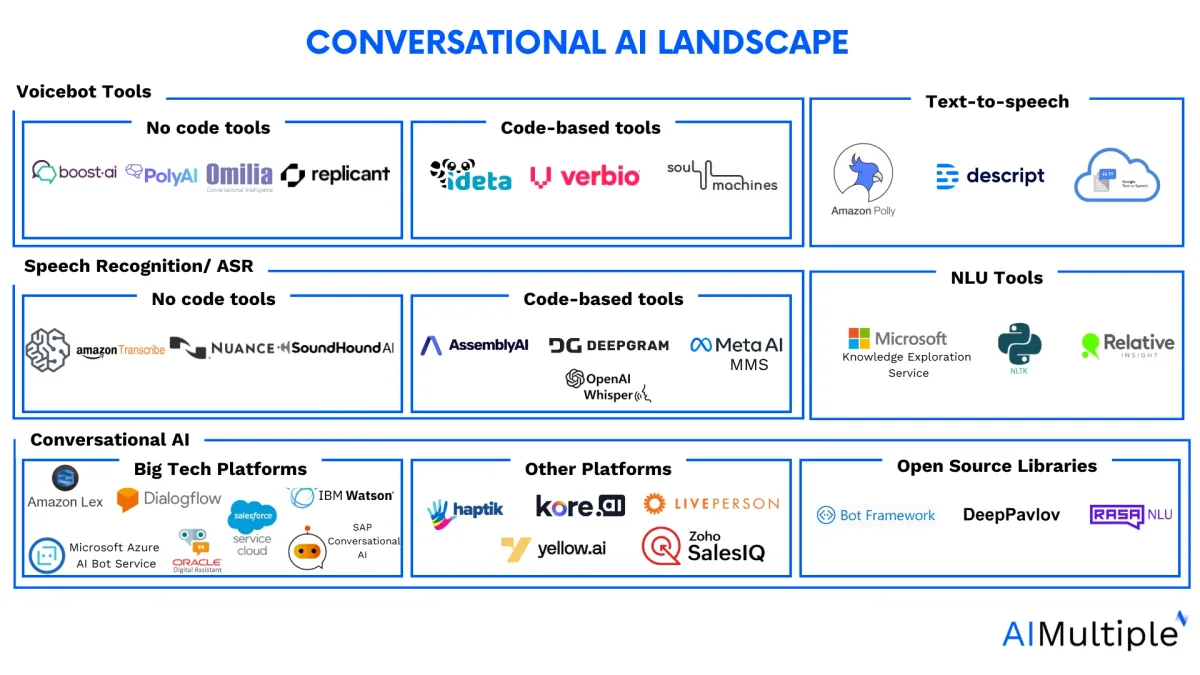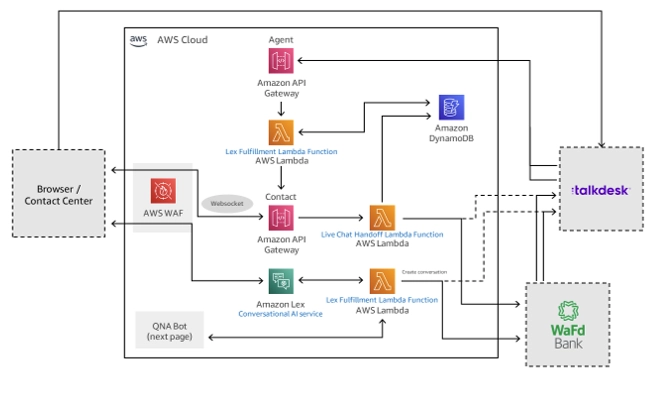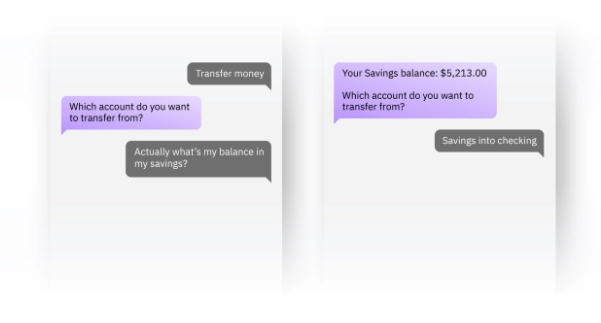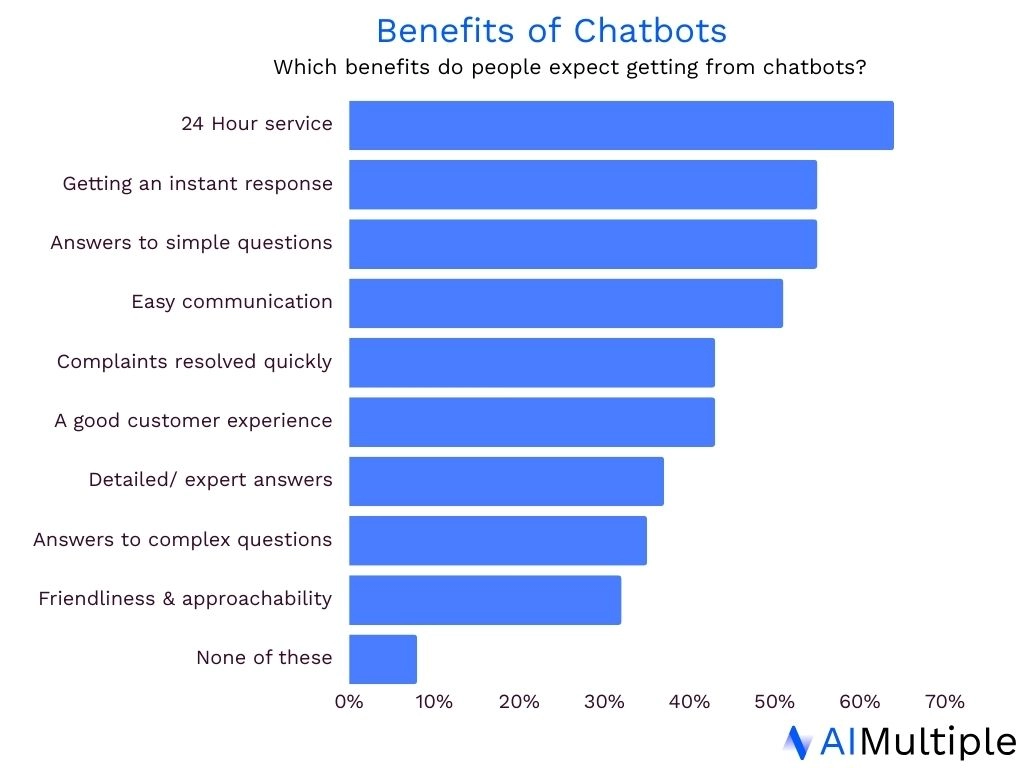Drawing from our expertise, we evaluated the top conversational AI solutions and compiled a list of leading vendors based on their key features and strengths:
Zoho SalesIQ: To get multi-language support & plug-and-play integration.
IBM watsonx assistant: To reach basic chatbot building tools for free
Azure Bot Service: For high volume of interactions
SAP Conversational AI: For pre-built bot templates
Amazon Lex: Speech recognition & AWS integrations
LivePerson Conversational Cloud
Yellow AI: For Southeast Asian users
Google Dialogflow: For Google integrations & intent recognition
People hate waiting on the line. Enterprises need conversational customization at scale to affordably delight their customers and to handle high volume of queries. The problem is, there are over 200 conversational AI platforms, making it hard to choose. Enterprises can find the right solutions by focusing on key features:
- Integrations to their tech stack
- Integrations to platforms of their customers
- Customization in customer communication and more.
We identified the 12 top solutions based on their user reviews and included their key features and pricing:
Top conversational AI platforms
| Vendor | Type/Focus | Employee Size | Avarage Score & Number of Reviews |
|---|---|---|---|
| Zoho SalesIQ | Conversational AI + Other | 10K+ | 4.4 based on 400 |
| IBM watsonx Assistant | Conversational AI /Big-tech | 4.3 based on 376 | |
| Azure Bot Service | Conversational AI /Big-tech | 244,900 | 4.0 based on 16 |
| Oracle Digital Assistant Cloud | Conversational AI /Big-tech | 196,946 | 4.4 based on 9 |
| SAP Conversational AI | Conversational AI /Big-tech | 121,379 | 4.2 based on 67 |
| Amazon Lex | Conversational AI / Big-tech | 130,371 | 3.6 based on 38 |
| LivePerson Conversational Cloud | Conversational AI / Other | 1,487 | 3.9 based on 220 |
| Kore | Conversational AI / Other | 1,078 | 4.6 based on 16 |
| Canary by Yellow Messenger | Conversational AI / Other | 988 | n/a |
| DeepSeek | Conversational AI / Other | 57 | n/a |
| Dialogflow | Conversational AI /Big-tech | 300,114 | 4.4 based on 37 |
*Apart from our sponsors, Freshchat and Zoho SalesIQ, the table is sorted by number of employees.
The table offers 3 rubrics of information in screening process:
- First, we divide platforms into different categories according to their focus.
- Then, we evaluated the performance of the company and the platform by looking at criteria like the number of employees, reviews and average scores. Review numbers were calculated based on major platforms Capterra, G2 and Trustradius. Vendors with 10+ employees and 3.5+ scores entered the list.
- We included platforms with fundamental chatbot platform features like omnichannel deployment.
Large language models are different and important dimension of conversational AI. For detailed model based analysis of LLM models, check:
For API & UI features of general purpose LLMs check:

Breaking down 11 conversational AI platforms
In this section, we provide more information regarding platforms’ key features. For clarity once we want to highlight that all conversational AI platforms in this section provide:
- Conversational AI solutions such as:
- Virtual assistants
- Chatbots
- Voice assistants
- Speech recognition services etc.
- Multiple channels integration
- Live agent handover
- Bilingual conversational AI tools.
We listed all the vendors in alphabetical order except the sponsors.
1.Zoho SalesIQ
Zoho SalesIQ is considered amongst domain-specific platform with its specifically tailored services in sales and customer engagement. The all-in-one live chat and analytics platform enables businesses to actively engage with customers. Zoho SalesIQ’s features include:
- Visitor tracking
- Smart chatbots
- Various communication modes (e.g. voice note, audio call, screen share, remote access)
- Resource library (articles, FAQs)
- Contact management (B2C, B2B) and more.
Pricing
Apart from the free version, Sales IQ also offers a 15-day trial for the paid versions. Customers can also customize plans with optional add-ons.1 See the table below for detailed information about the packages:
| Plan | Price (yearly & monthly) | Key Features Accessible | Plus Features Offered* |
|---|---|---|---|
| Free | 0 | -3 operator licenses -Visitor insights (10K visitors/month) -100 chat sessions/month | -Basic visitor information -Voice note – Mobile SDK -Integration with Zoho apps |
| Basic | €7 (billed annually) €10 (billed monthly) | -1 operator license -Visitor insights (50K visitors/month) -1000 chat sessions/month -1 chatbot | -Messaging channels -FAQ & Articles -Email signature chat -Third-party integrations |
| Professional | €12.75 (billed annually) €17 (billed monthly) | -1 operator license -Visitor insights (100K visitors/month) -Unlimited chat sessions -5 chatbots | -Custom widgets -Block IP -Weekly and monthly reports -Apple TV app |
| Enterprise | €20 (billed annually) €25 (billed monthly) | -1 operator license -Visitor insights (200K visitors/month) -Unlimited chat sessions -10 chatbots | -Chat translation -NLP driven Answer Bot -Integrations with Cloud Telephony and PBX systems |
*Each plan includes all the features of the plan that precedes it, plus the features in the table and more. Thus, Basic includes all the features of Free, Professional includes all the features of Basic and Enterprise includes all the features of Professional.
Key features:
Real-time visitor tracking: Customers can get detailed visitor tracking data, including page views, location, and referral sources, to help your business better understand your visitors and personalize the buyer journey.
Plug-and-play integration with 30+ apps: SalesIQ can be seamlessly integrated with other Zoho products, such as Zoho CRM and Zoho Desk, and third-party tools allowing businesses to easily access and analyze customer data from a single platform.
Multiple language support: SalesIQ is available in 28+ languages, including Japanese, Thai, Korean, Polish, Danish, Hindi, and Chinese. This makes it easier for businesses to communicate with a global audience.
Choose Zoho SalesIQ to get multi-language support & plug-and-play integration.
2.Amazon Lex
Amazon Lex is the conversational AI platform of Amazon Web Services. Some of the key features are:
- Natural Language Understanding (NLU) for building conversational interfaces.
- Multi-channel support. Integration with voice and chat platforms.
- Speech recognition capabilities for voice interactions.
- Automated intent recognition to understand user inputs.
- Integration with AWS services like Amazon Connect for call centers and Amazon Kendra for search.
Pricing
| Pricing Component | Cost | Details |
|---|---|---|
| Request and Response Interaction | $0.004 per speech request | Each speech input is counted as a request. |
| $0.00075 per text request | Each text input is counted as a request. | |
| Streaming Conversation | $0.0065 per 15 seconds of audio | Continuous streaming of user inputs across multiple turns. |
| Automated Chatbot Designer | $0.50 per minute of training | Time required to analyze transcripts and identify intents. |
Case study

Amazon Lex is used by WaFd Bank to develop a conversational interface for customer support through its virtual assistant. Lex processes both voice and text interactions. It enabled customers to ask questions and receive answers about services, such as balance inquiries or branch locations. The solution helps the bank automate common customer queries and improve service efficiency across multiple channels.
3.DeepSeek
DeepSeek, a Chinese AI startup, has gained recognition for its progress in artificial intelligence, particularly with its R1 model, which surpassed OpenAI’s O1 in several benchmarks. The company has established itself as a prominent AI research lab by emphasizing foundational technology.
Pricing
| Model | Context Lenght | Max Cot Tokens | Max Output Tokens | 1M Tokens Input Price (Cache Hit) | 1M Tokens Input Price (Cache Miss) | 1M Tokens Output Price |
|---|---|---|---|---|---|---|
| deepseek-chat | 64K | – | 8K | $0.07(5) $0.014 | $0.27(5) $0.14 | $1.10(5) $0.28 |
| deepseek-reasoner | 64K | 32K | 8K | $0.14 | $0.55 | $2.19 (6) |
Key features
- Open-source: DeepSeek has made its generative AI chatbot open source, allowing unrestricted access to its code. Users can modify, view, and utilize the model as needed.
- Computational capacity: DeepSeek trains its AI models with significantly fewer resources compared to industry peers. The DeepSeek-V3 model was trained using approximately 2K Nvidia H800 GPUs over 55 days at a cost of $5.58 million, far lower than similar projects by major tech firms.
- Impact on AI models: After launching DeepSeek-V2 in May 2024, the model influenced a price reduction in China’s AI industry.
Case study
A global investment firm managing over $50 billion in assets faced challenges in:
- algorithmic trading with high latency,
- suboptimal risk-adjustment
Their legacy systems struggled with processing high-frequency data. DeepSeek implemented a hybrid AI model combining supervised learning with LSTM networks for short-term price prediction. The solution was trained on over 10 years of equity data, processed using AWS Glue, and deployed with Kubernetes.
Results:
- Annualized returns increased from 8% to 22%,
- Transaction costs dropped by 35%,
- The model expanded asset coverage from 500 to over 2,000 globally while maintaining low-latency execution at 2ms.
4.Google Dialogflow
Dialogflow is Google’s chatbot platform that is designed to improve customer satisfaction. Some key features include:
- Multi-channel integration for voice and text-based interactions via platforms like Google Assistant, mobile apps, and social media.
- Integration with other Google services like Cloud Functions for complex workflows and BigQuery for analytics.
- Training and managing multiple intents and entities for more refined user interaction
Pricing
| Pricing Component | Cost | Details |
|---|---|---|
| Dialogflow ES | Free for up to 180 requests/minute | Free for up to 7.5 million text requests per month. |
| $0.002 per request | Charges apply beyond 180 text requests per minute. | |
| $0.0065 per 15 seconds of audio | Charges apply for audio input or output. | |
| Dialogflow CX | $0.007 per text request | Pricing for advanced CX agent usage. |
| $0.001 per second of audio | Charges apply for audio input or output. | |
| Free Trial | $600 credit | New customers get a $600 credit for a no-cost trial. |
Case study

KLM Royal Dutch Airlines used Google Dialogflow to improve customer service through a chatbot that manages customer inquiries across multiple platforms, including social media and their website. The chatbot handled common queries such as flight information, booking assistance, and travel updates. Dialogflow’s natural language processing helped KLM manage customer interactions in multiple languages.
5.IBM watsonx Assistant
IBM Watson Assistant is a leading conversational AI platform that managers may utilize to:
- To the point documentation: IBM’s documentation offers practices to optimize benefits of investment in addition to all the information required for deploying conversational AI products.
- Integration with IBM Watson Discovery for improved information retrieval.
- Analytics and insights to monitor and improve chatbot performance.
Pricing
| Pricing Plan | Cost | Key Features |
|---|---|---|
| Lite | Free | Basic tools for building AI chatbots. |
| Plus | Starting at $140/month | Phone and SMS integration, 1,000 MAUs, additional MAUs at $14/100, additional RUs at $0.6/1000. |
| Enterprise | Custom pricing available | Enhanced for enterprise use with advanced support and data governance. |
The features differ significantly in IBM pricing plans. 2
Case study

Humana used IBM Watsonx Assistant to handle healthcare provider inquiries about patient insurance coverage. The voice agent processes over 7,000 calls daily. Humana utilized key features such as:
- Natural language processing to understand and respond to complex healthcare queries.
- Speech customization with multiple language and acoustic models.
- Integration with IBM Cloud and Watson Discovery for accurate and quick data retrieval.
6. Microsoft Azure Bot Service
The Azure Bot Service offers cloud-based tools to build, test, deploy, and manage intelligent bots across various channels, including web chat, email, SMS. Key features are:
- Multi-channel integration for deploying bots across web, mobile apps, Microsoft Teams, and social media.
- Bot Framework SDK for building and customizing bot logic.
- Integration with Azure AI, such as Language Understanding (LUIS) for intent recognition.
- Scalable cloud infrastructure to support high-volume interactions.
Pricing
| Pricing Component | Cost | Key Features |
|---|---|---|
| Standard Channels | Free | Includes web chat, email, and more. |
| Premium Channels | $0.50 per 1,000 messages | Supports SMS, telephony, and other premium channels. |
| Direct Line Speech | $1.50 per 1,000 messages | Voice support with speech recognition capabilities. |
The Microsoft team offers distinct prices for different features in different regions.3
Case study
The City of Corona partnered with Attunix to build a chatbot using the Microsoft Bot Framework to help citizens find answers to common questions and reducing call volumes. The chatbot used technologies such as QnA Maker, Azure Cognitive Services, and Bing Search to retrieve and present relevant information. They utilized Azure in:
- Natural language processing for understanding queries.
- Pre-built intents and entities to handle requests.
- Analytics for performance tracking.
- Integration with data sources to enhance responses
7.Oracle Digital Assistant
Oracle digital Assistant is another top conversational AI platform that helps companies to enhance customer experience. Some key features are:
- Natural Language Processing (NLP) to understand user intent and context. It recognizes pattern of behavior.
- Integration with Oracle Cloud and third-party applications.
- Pre-built skills for common business functions like HR, sales, and customer service.
Pricing
| Pricing Plan | Cost | Key Features |
| Digital Assistant Cloud | Per request | Charged based on the number of requests. |
| Oracle SaaS Hosted Employee | Monthly subscription | Pricing per hosted employee. |
| Oracle SaaS Hosted User | Monthly subscription | Pricing per hosted named user. |
| Oracle SaaS Sessions | Monthly subscription | Pricing for blocks of 1,000 sessions. |
8.SAP conversational AI
System Applications and Products (SAP) is a company that offers technology to businesses. SAP is generally known for their ERP systems. In order to expand their NLP capabilities and provide conversational AI tools that assist their clients conduct interactions in an efficient manner, SAP purchased the French business Recast.AI in 2018. Some key features are:
- Pre-built bot templates: Provides templates for common business use cases, like customer support and HR tasks.
- Integration with SAP Solutions: Natively integrates with SAP applications such as S/4HANA and SuccessFactors.
- Customizable skills: Allows customization and extension of bot skills for specific workflows.
Pricing
There is no clear information on SAP conversational AI’s price policy from either internal or external sources. Therefore, we suggest prospective users to get in touch with the business.
Case study
Discovery Limited, a South African insurer, used SAP solutions to improve HR self-services, reducing time-to-hire by 25% and achieving cost savings of up to €1.3 million. SAP Conversational AI enabled employees to efficiently manage HR tasks through automation and self-service capabilities. They used key features such as:
- Natural Language Understanding (NLU) for HR inquiries.
- Integration with SAP SuccessFactors.
- Multi-channel deployment for employee interactions.
- Automation of routine HR tasks, improving operational efficiency.
9.Kore.ai Experience Optimization (EO) Platform
Kore.ai Experience Optimization (EO) platform is the conversational AI platform of Kore.ai that aims to automate customer support and interactions. Some key features include:
- Journey mapping: Tracks user journeys to optimize interactions.
- Bot customization: Allows businesses to tailor bots to specific needs.
- AI-powered recommendations: Suggests actions based on user data.
Pricing
Essential plan
- Price: $29 per agent per month (paid yearly):
- 30 agents
- inbound voice and web chat channels
- voicemail
- real-time queue monitoring
- full Academy access
- email support, and proactive campaigns.
- Add-ons: XO Voice Gateway.
Advanced plan
- Price: $49 per agent per month (paid yearly):
- Everything in the Essential plan, plus support for up to 300 agents +
- 30+ digital channels, call-back requests, surveys, custom widgets
- 50 custom KPIs for analytics, live chat support
- Add-ons: XO Voice Gateway.
Enterprise package prices are custom according to the vendors need and demands.
Kore.ai also provides a free demo of their conversational platform.
10.LivePerson Conversational Cloud
LivePerson Conversational Cloud is LivePerson’s conversational AI platform that is designed to automate conversations. Thus, the platform improves corporations’ operational efficiency. Some other key features include:
- AI-Powered Messaging: Automates conversations using AI for customer service, sales, and marketing.
- Human-agent handoff: Transfers complex cases from bots to live agents when needed.
- Intent Recognition: Understands customer queries to offer relevant responses.
- Integration with CRM Systems: Connects to existing enterprise systems for personalized support.
Pricing
Neither external nor internal sources provide clear information regarding pricing policy of Live person. Therefore, we advise potential users to contact the company.
11.Yellow.ai Enterprise Conversational AI & Chatbot Platform
Yellow.ai have expertise in India and South East Asia, where businesses substantially invest in conversational AI solutions, as we highlight in our article on Yellow.ai’s competitors. Some key features include:
- Multi-channel Support: Engages customers across chat, voice, email, and messaging apps.
- No-Code/Low-Code Bot Building: Allows easy customization and deployment of bots.
- Analytics and Reporting: Provides insights into user interactions and bot performance..
Pricing
Neither Yellow.ai nor outside sources share the price policy of the company. However, Yellow.ai offers a free demo.
Conversational AI landscape
| Name of Platform/Company | Category |
|---|---|
| Amazon Lex | Conversational AI / Big Tech |
| Amazon Poly | Voicebot / Text to Speech |
| Amazon Transcribe | Speech Recognition – No code |
| Amelia.ai | Voicebot / No Code |
| Assembly.ai | Speech Recognition / Code Based |
| Boost.ai | Voicebot / No Code |
| Bot Framework | Conversational AI/ Open Source |
| Deepgram | Speech Recognition / Code Based |
| Descript | Conversational AI / Open Source |
| Freshchat | Conversational AI / Big Tech |
| Google Dialogflow | Conversational AI / Big Tech |
| Google text to Speech | Text to Speech |
| Haptik | Conversational AI / Other |
| IBM Watson Assistant | Conversational AI / Big Tech |
| Ideta.io | Speech Recognition / Code Based |
| Kore.ai Experience Optimization (EO) Platform | Conversational AI / Other |
| LivePerson Conversational Cloud | Conversational AI / Other |
| Meta AI | Speech Recognition / Code Based |
| Microsoft Azure Bot Service | Conversational AI / Big Tech |
| Microsoft Knowledge Exploration Service | Speech Recognition / NLU |
| NLTK | Speech Recognition / NLU |
| Nuance | Speech Recognition / No Code |
| Open AI Whisper | Speech Recognition / Code Based |
| Oracle Digital Assistant | Conversational AI / Big Tech |
| PolyAI | Voicebot / No code |
| Relative | NLU |
| Replicant | Voicebot / No code |
| Salesforce Service Cloud | Conversational AI / Big Tech |
| SAP Conversational AI | Conversational AI / Big Tech |
| Soul Machines | Speech Recognition / Code Based |
| Soundhound | Speech Recognition / No Code |
| Verbio | Speech Recognition / Code Based |
| Yellow.ai Enterprise Conversational AI & Chatbot Platform | Conversational AI / Other |
Conversational AI market is complex because of:
- High number of platforms and tools
- Variety of tools based on different capabilities
- Targeted end-users (e.g Developers).
Therefore, we identified the major categories and mapped out the top players to navigate better (See cover image). These five main categories include:
Conversational AI platforms
Conversational AI platforms offer comprehensive solutions for building, deploying, and managing conversational AI applications. These platforms often include a combination of NLU, TTS, ASR, and voicebot capabilities, along with additional features for chatbot development and integration with various channels. This category may encompass:
- Big tech platforms: Major technology companies like Amazon and IBM offer comprehensive conversational AI platforms that combine NLU, TTS, ASR, and voice bot capabilities. These platforms are known for their scalability, reliability, and integration with other services, making them suitable for large-scale applications.
- Other tools: Smaller vendors provide conversational AI platforms that may be more specialized or niche-focused. These platforms may cater to specific industries, use cases, or regional requirements. They often offer competitive features and pricing, making them attractive to businesses with unique needs.
- Open-source libraries: Open-source libraries provide developers with the freedom to build customized conversational AI solutions from the ground up. Libraries like Rasa provide the building blocks and tools needed to create chatbots and virtual assistants. This option is ideal for those who require complete control and customization and are comfortable with coding and development.
Domain specific platforms

Domain specific platforms refer to conversational software that can be tailored to understand and interact within a specific area of knowledge or industry. Contrary to general conversational AI platforms that are designed to handle a broad range of topics and queries, domain-specific platforms are fine-tuned to offer more relevant services and responses to businesses in a particular fields such as:
Voicebot tools
Voicebot tools facilitate the development of voice-activated chatbots and virtual assistants. These tools enable businesses and developers to build conversational AI systems that can understand and respond to spoken language. Voicebot tools come in two options:
- No-Code vcoicebot tools: No-code voicebot tools are designed for non-developers and allow them to create voice-activated chatbots and virtual assistants without writing code. These tools typically offer a user-friendly interface for designing conversational flows, configuring voice interactions, and integrating with various platforms and services.
- Developer voicebot tools: Developer voicebot tools are targeted at software engineers and developers. They provide more extensive customization options, allowing developers to create highly specialized voicebot solutions. These tools offer APIs, libraries, and SDKs that can be integrated into existing applications and systems.
Speech recognition tools (ASR)
Speech Recognition tools are responsible for transcribing spoken language into written text. ASR technology is vital for enabling voice interactions and voice commands in various applications. ASR can be categorized as:
- No-code ASR tools: No-code ASR tools are user-friendly platforms that enable non-technical users to incorporate automatic speech recognition into their applications or services with minimal coding. These tools often provide pre-built ASR models and easy-to-use interfaces for training and customization.
- Developer ASR tools: Developer ASR tools are designed for developers and engineers who need fine-grained control over the ASR process. They allow customizing ASR models for specialized applications, domains, and languages.
Natural language understanding (NLU) tools
NLU tools are designed to help machines understand and interpret human language. They are crucial for chatbots, virtual assistants, and other conversational AI systems to comprehend user input accurately. NLU tools process text or speech inputs, extract meaning, and identify entities, intents, and context.
Text-to-speech Tools (TTS)
Text-to-speech tools convert written text into natural-sounding speech. These tools are used to give conversational AI systems a voice and enable them to communicate with users through spoken language. TTS technology has improved significantly in creating more human-like voices.
LLMs disrupt conversational AI market
The adoption of large language model (LLM) applications is on the rise as business users recognize the powerful language generation capabilities exhibited by GPT models such as ChatGPT. LLMs affect Conversational AI market in various by:
- Improving NLU: LLMs bring a breakthrough in natural language conversations, enabling more nuanced and context-aware conversations. Enhanced comprehension of user inputs leads to more accurate and relevant responses, mimicking human-like interaction.
- Reducing specialization efforts: LLMs excel in adapting to various domains, from tech support to healthcare, reducing the need for specialized models for each industry. This versatility broadens the applicability of Conversational AI platforms, making them a go-to solution for diverse business needs.
- Increasing efficiency in training: LLMs streamline the training process by pre-training on massive datasets, significantly reducing the time and resources required for custom model development.
- Enhancing user experience: Improved language generation capabilities contribute to a more engaging and dynamic user experience. Users benefit from a more interactive and personalized interaction, enhancing satisfaction and retention.
- Ensuring fair and inclusive interaction: The rise of LLMs necessitates a closer examination of ethical considerations, particularly in addressing biases present in training data.
Therefore, more conversational AI vendors look ways to pair generative AI tools and capabilities like LLMs in their platforms to improve their services, such as:
We recommend you to explore these tools and learn top differences between Generative AI and Conversational AI before employing any chatbot in your business.
Further readings
- Conversational Commerce Platforms Benchmarking
- Top 5 WhatsApp Business Partners
- Top 5 Chatbot Companies in India: Evaluation & Examples
- 50+ Chatbot Companies To Deploy Conversational AI
- Top 25 Chatbot Case Studies & Success Stories
If you have further questions regarding conversational AI platforms and best conversational ai platform, you can reach us:
Note:
The below table illustrates all the conversational AI platforms we evaluated in an alphabetic order:
External Links:
External Links
- 1. “User-based plans that scale with your team“. Zoho SalesIQ. Retrieved on November 23, 2023.
- 2. ”IBM watsonx Assistant Pricing” Retrieved on July 3, 2024
- 3. Microsoft Pricing.
- 4. Baer, J. “The 6 Critical Chatbot Statistics for 2018.” Convenience & Convert. Retrieved November 10, 2023

Comments
Your email address will not be published. All fields are required.